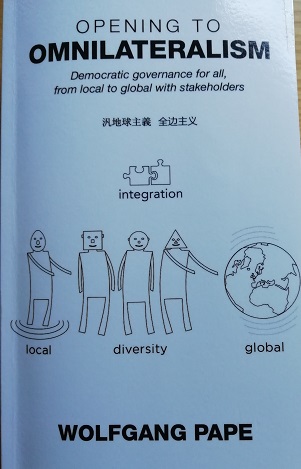
One of the sharp dividing lines that have been running through all leftist and progressive movements for decades is related to the State. It is necessarily good for all those who consider change only possible by seizing power within a sovereign State, it is necessarily evil for those who consider it impossible that the raison d’être of the State can coincide with the interests of the people.
The central role of the State is today again under strong attack from two different progressive directions.
At this moment, a Zapa-group is touring Europe, a delegation of Mexican neo-Zapatistas who are organising a ‘reverse invasion’ and are coming here to talk to all kinds of social movements. One of their beliefs is ‘community autonomy’, and although they are not entirely averse to participating in national electoral processes, they mainly promote the plurinational State that offers room for various cultures. In this way, they connect with various movements in Europe and Asia that denounce the hegemony and arbitrariness of nation states.
Another starting point is the failure of multilateralism in a world order that can no longer be of this time. The solution then lies not only in a return to the subnational level, but in a democratisation of both local and supranational institutions.
This is the thesis of the author of the book ‘Opening to Omnilateralism. Democratic governance for all, from local to global with stakeholders‘. Wolfgang Pape is a former civil servant of the European Commission and European Union diplomat with extensive experience in Japan and work for the ‘cellule prospective’ that Commission President Delors set up to look at the future.
Pape’s central thesis is that there is a need to work both horizontally and vertically. Vertically, by organising decision-making differently and taking account of the practical possibilities: locally, direct democracy can be very useful, but to decide on the Paris climate agreement at a global level, other mechanisms are needed. Horizontally, by listening to and learning from each other. The author refers to the civilisational powers of India, China and Japan. It is the combination of both methods that leads to ‘omnilateralism’: for and by everyone, not just with States but with all stakeholders. Today, by the way, both NGOs and business are already active at the global level.
All these points are explained in detail in several chapters, from the aberration of the European nation state to today’s technology-dominated globalisation, to the flawed multilateralism in which a mini-state like Nauru has as much of a voice as superpower China. Chapter four is about what more inclusive governance might look like, and chapter five about how today’s ‘democracies’ are particularly inadequate.
The author then elaborates sixteen theses that are largely based on a conviction of a different value system in East and West. It is precisely because more and more peoples today are once again becoming aware of their separate ‘identities’ that it is becoming vital to listen to and learn from each other. The dominant Western way of thinking has had its day and it is precisely through increased communication and exchange that the common features of the different value systems can be brought to light. In this way, the author surprisingly arrives at both the unique formula of pooling sovereignty in the European Union and at Islamic banking, the Tobin Tax, rice terraces in the East and the sophisticated agricultural methods of pre-Columbian cultures in America.
These are all interesting points of view, although one wonders how the many conflicting interests can be reconciled. Involving ‘stakeholders’ sounds good, but CEOs will continue to put their company’s profits first, while NGOs rarely look beyond the sectoral interests they defend, from the disabled to children, women and indigenous peoples. It takes a more than immense effort to go beyond self-interest.
Furthermore, it is certainly true that Japanese and Chinese live with different values and norms than Africans and Europeans, but has capitalism not placed a thick veil over all these differences in order to emphasise our individual self-interest? During this COVID-19 crisis, it was almost impossible in many countries to put the collective interest of public health above personal freedom. And furthermore, if traditional values and religions have been undermined, is that not a great victory? Are not the basic values and moral principles the same for the whole of humanity? Could that then be the common thread?
This book offers tremendously interesting perspectives because it looks at the world order in an innovative way, takes into account cultural differences and offers practical solutions. This is the work of an author who has worked internationally and stands literally in the world. The work of international civil servants is still far too systematically underestimated while they are the only ones with practical experience of political cooperation and can shed light on innovative possibilities. Personally, I think this new model still needs a lot of polishing, but omnilateralism offers an awful lot more than a sterile return to the illusion of ‘sovereignty’.
Published 2021 by AuthorHouse, ISBN 978 1 6655 8315 2